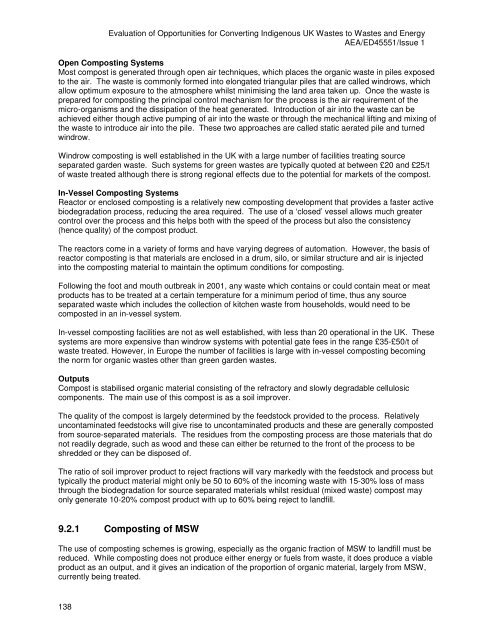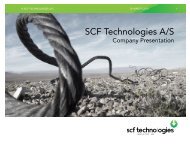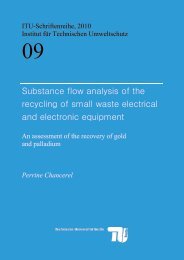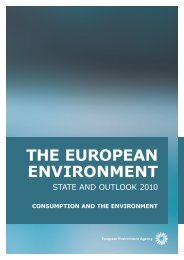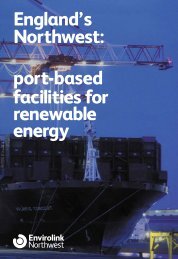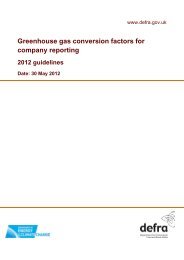to read the full report - Ecolateral by Peter Jones
to read the full report - Ecolateral by Peter Jones
to read the full report - Ecolateral by Peter Jones
Create successful ePaper yourself
Turn your PDF publications into a flip-book with our unique Google optimized e-Paper software.
138<br />
Evaluation of Opportunities for Converting Indigenous UK Wastes <strong>to</strong> Wastes and Energy<br />
AEA/ED45551/Issue 1<br />
Open Composting Systems<br />
Most compost is generated through open air techniques, which places <strong>the</strong> organic waste in piles exposed<br />
<strong>to</strong> <strong>the</strong> air. The waste is commonly formed in<strong>to</strong> elongated triangular piles that are called windrows, which<br />
allow optimum exposure <strong>to</strong> <strong>the</strong> atmosphere whilst minimising <strong>the</strong> land area taken up. Once <strong>the</strong> waste is<br />
prepared for composting <strong>the</strong> principal control mechanism for <strong>the</strong> process is <strong>the</strong> air requirement of <strong>the</strong><br />
micro-organisms and <strong>the</strong> dissipation of <strong>the</strong> heat generated. Introduction of air in<strong>to</strong> <strong>the</strong> waste can be<br />
achieved ei<strong>the</strong>r though active pumping of air in<strong>to</strong> <strong>the</strong> waste or through <strong>the</strong> mechanical lifting and mixing of<br />
<strong>the</strong> waste <strong>to</strong> introduce air in<strong>to</strong> <strong>the</strong> pile. These two approaches are called static aerated pile and turned<br />
windrow.<br />
Windrow composting is well established in <strong>the</strong> UK with a large number of facilities treating source<br />
separated garden waste. Such systems for green wastes are typically quoted at between £20 and £25/t<br />
of waste treated although <strong>the</strong>re is strong regional effects due <strong>to</strong> <strong>the</strong> potential for markets of <strong>the</strong> compost.<br />
In-Vessel Composting Systems<br />
Reac<strong>to</strong>r or enclosed composting is a relatively new composting development that provides a faster active<br />
biodegradation process, reducing <strong>the</strong> area required. The use of a ‘closed’ vessel allows much greater<br />
control over <strong>the</strong> process and this helps both with <strong>the</strong> speed of <strong>the</strong> process but also <strong>the</strong> consistency<br />
(hence quality) of <strong>the</strong> compost product.<br />
The reac<strong>to</strong>rs come in a variety of forms and have varying degrees of au<strong>to</strong>mation. However, <strong>the</strong> basis of<br />
reac<strong>to</strong>r composting is that materials are enclosed in a drum, silo, or similar structure and air is injected<br />
in<strong>to</strong> <strong>the</strong> composting material <strong>to</strong> maintain <strong>the</strong> optimum conditions for composting.<br />
Following <strong>the</strong> foot and mouth outbreak in 2001, any waste which contains or could contain meat or meat<br />
products has <strong>to</strong> be treated at a certain temperature for a minimum period of time, thus any source<br />
separated waste which includes <strong>the</strong> collection of kitchen waste from households, would need <strong>to</strong> be<br />
composted in an in-vessel system.<br />
In-vessel composting facilities are not as well established, with less than 20 operational in <strong>the</strong> UK. These<br />
systems are more expensive than windrow systems with potential gate fees in <strong>the</strong> range £35-£50/t of<br />
waste treated. However, in Europe <strong>the</strong> number of facilities is large with in-vessel composting becoming<br />
<strong>the</strong> norm for organic wastes o<strong>the</strong>r than green garden wastes.<br />
Outputs<br />
Compost is stabilised organic material consisting of <strong>the</strong> refrac<strong>to</strong>ry and slowly degradable cellulosic<br />
components. The main use of this compost is as a soil improver.<br />
The quality of <strong>the</strong> compost is largely determined <strong>by</strong> <strong>the</strong> feeds<strong>to</strong>ck provided <strong>to</strong> <strong>the</strong> process. Relatively<br />
uncontaminated feeds<strong>to</strong>cks will give rise <strong>to</strong> uncontaminated products and <strong>the</strong>se are generally composted<br />
from source-separated materials. The residues from <strong>the</strong> composting process are those materials that do<br />
not <strong>read</strong>ily degrade, such as wood and <strong>the</strong>se can ei<strong>the</strong>r be returned <strong>to</strong> <strong>the</strong> front of <strong>the</strong> process <strong>to</strong> be<br />
shredded or <strong>the</strong>y can be disposed of.<br />
The ratio of soil improver product <strong>to</strong> reject fractions will vary markedly with <strong>the</strong> feeds<strong>to</strong>ck and process but<br />
typically <strong>the</strong> product material might only be 50 <strong>to</strong> 60% of <strong>the</strong> incoming waste with 15-30% loss of mass<br />
through <strong>the</strong> biodegradation for source separated materials whilst residual (mixed waste) compost may<br />
only generate 10-20% compost product with up <strong>to</strong> 60% being reject <strong>to</strong> landfill.<br />
9.2.1 Composting of MSW<br />
The use of composting schemes is growing, especially as <strong>the</strong> organic fraction of MSW <strong>to</strong> landfill must be<br />
reduced. While composting does not produce ei<strong>the</strong>r energy or fuels from waste, it does produce a viable<br />
product as an output, and it gives an indication of <strong>the</strong> proportion of organic material, largely from MSW,<br />
currently being treated.


